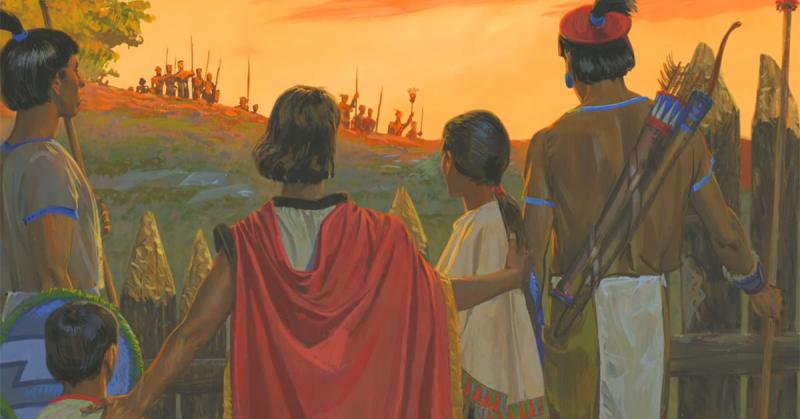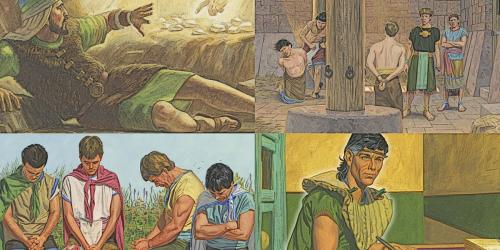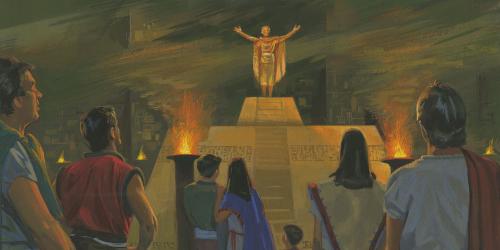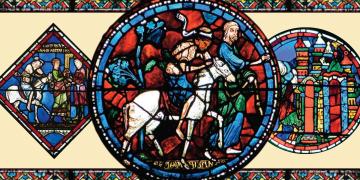You are here
Book of Mormon Central is in the process of migrating to our new Scripture Central website.
We ask for your patience during this transition. Over the coming weeks, all pages of bookofmormoncentral.org will be redirected to their corresponding page on scripturecentral.org, resulting in minimal disruption.
In 2 Corinthians, Paul told the saints in Corinth a little about the trials and sufferings he had on his missionary journeys. His message was one of hope, that trials are here to strengthen us:
We are troubled on every side, yet not distressed; we are perplexed, but not in despair; Persecuted, but not forsaken; cast down, but not destroyed …. For our light affliction, which is but for a moment, worketh for us a far more exceeding and eternal weight of glory (2 Corinthians 4:8–9, 17)
Paul taught that even though trials and adversity can be troubling and oppressive, they do not have power to break the spirit if one’s eye is single to the glory of God. Not only do trials have the potential to make us more empathetic to the plights of others, but they have the ability to give us an “eternal weight of glory.”
In the Book of Mormon, the brother of Jared very literally beheld a “weight of glory” after he asked the Lord how to light the Jaredite barges in their journey across the sea. Rather than quickly giving the brother of Jared the answer, the Lord required him to struggle through the problem on his own. After the brother of Jared had “molten out of a rock sixteen small stones” (Ether 3:1) and asked the Lord in faith to cause the stones to shine, the brother of Jared beheld “the finger of the Lord” (v. 6), the Lord’s spiritual body (v. 16), and “all things” (v. 26).
However, not everyone receives immediate reward for their struggles. More frequently, the blessings we obtain for faithfully enduring adversity and persecution are delayed. The ultimate “weight of glory” awaits the faithful followers of Jesus Christ in the next life.
The poor among the Zoramites in the Book of Mormon could certainly relate to feelings of being “trouble on every side,” “persecuted,” and “cast down” (2 Corinthians 4:8–9). They were kicked out of their synagogues for being poor, and were then persecuted for believing in the gospel preached by Alma and Amulek. Even after these poor Zoramites found refuge in the land of Jershon, their persecution did not end. The anger that the wicked Zoramites felt towards these refugees and those who took them in is what initiated a series of terrible, drawn-out wars between the Nephites and the Lamanites (Alma 43–62).1
In this case, faithfulness to the gospel of Jesus Christ did not just hurt themselves, but the lives of those around them. Why was it important for the believers to stay faithful, when their faith in the gospel not only cost them persecution, but cost hundreds of Nephites and Lamanites their lives in a bloody war? It doesn’t sound like the happiness King Benjamin promised to those who keep the commandments (Mosiah 2:41).
The answer to this and similarly difficult questions is not straight-forward. However, the Book of Mormon can add some insight. Upon seeing the wars among the Nephites, Alma counseled his sons and taught them the most urgent truths of the gospel of Jesus Christ. Alma taught his son Corianton:
The resurrection of the dead bringeth back men into the presence of God … to be judged according to their works, according to the law and justice. For behold, justice exerciseth all his demands, and also mercy claimeth all which is her own; and thus, none but the truly penitent are saved. (Alma 42:23–24)
We ultimately cannot know how God will reward the faithful or punish the wicked in this life. But because of the Atonement of Jesus Christ and the resurrection of mankind, we can have faith that God is perfectly just and merciful. All will be rewarded for their faith in Jesus Christ, and also be held accountable for their errors. Faith in Jesus Christ can give us the peace and assurance that even in life’s most morally perplexing situations, God will be just.
Related Articles
- 1. Book of Mormon Central, “Why Was the Zoramite Defection So Disastrous? (Alma 35:11),” KnoWhy 143 (July 14, 2016).
Subscribe
Get the latest updates on Book of Mormon topics and research for free












